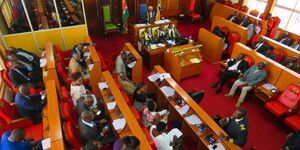A ruling by the Supreme Court on come-we-stay unions rendering them legally unrecognisable made Kenyans develop cold feet on what was ideally viewed as a rite of passage.
The ruling by the apex court brought to light some of the laws governing marriage in the country.
Kenyans.co.ke looked at the Marriage Act (2014) and compiled some of the laws affecting couples who intend to get married and came up with the following:
Notice of Marriage
Section 8 of the Act dictates that any person who intends to marry under Kenyan law must give to the registrar of marriages in the locality where he or she resides a notice of the same.
The registrar officially publishes the notice and gives a copy of the same to the couple. He or she then issues a certificate of registration within 21 days after verifying that either the bride or groom is from the locality
However, the couple risks cancelling their marriage celebration under one circumstance.
"If the marriage does not take place within three months after the date of notice, the notice and all proceedings thereupon shall be void and a fresh notice must be given before the parties can lawfully marry," reads Section 12 of the act.
Marriage Celebration time
Couples need to obtain a go-ahead to marry from a licenced minister from any denomination before proceeding with the marriage celebration.
The law further dictates the time frame within which the celebrations should be conducted.
"All marriages shall be celebrated between 8a.m and 6 p.m," Section Six of the General Marriage Rules Act reads.
Who can marry
The law prescribes that only bachelors, spinsters, widows, widowers, divorced or married under customary law are allowed to enter into a civil marriage.
Nonetheless, it prohibits any individual from marrying another whom they know is already committed to another civil marriage.
"Whoever, being unmarried, goes through the ceremony of marriage with a person whom he or she knows to be married to another person shall be liable to imprisonment for a period not exceeding five years," the law dictates.
It prohibits any individual married through customary or native law to register for marriage or vice versa, with those found liable risking a term of no more than five years.
Bigamy: Marrying an Individual in a marriage
The Penal Code, however, allows marriage involving a married person if the current marriage was declared void by a court of competent jurisdiction. Wives and husbands of absent partners are also allowed to enter into new marriages.
"This section shall not extend to any person whose marriage if the husband or wife, at the time of the subsequent marriage, has been continually absent from such person for the space of seven years, and has not been heard of by such person as being alive within that time," reads Section 171.
Opposing a marriage
Any person opposed to a marriage may enter a caveat by adding the word 'forbidden' to the notice of marriage on the marriage notice book. This prohibits the certificate to be issued by the register.
The matter proceeds to the Supreme Court which rules to have it removed or approved. Couples may be awarded compensation and costs if a caveat was issued on insufficient grounds.
However, if any individual makes untruthful or fabricated claims in a bid to stop a wedding ceremony, then he or she faces a jail term.
"Whoever endeavours to prevent a marriage knowing that such pretence is false or without having reason to believe that it is true, be guilty of an offence and liable to imprisonment for a term not exceeding two years," the Marriage Act reads.












